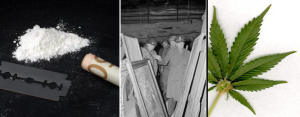Story Highlights
- The $125 million theft of five paintings by artists like Picasso and Matisse from the Museum of Modern Art in Paris in May caught the attention of the world. But compared with the total annual trade in illicit goods, the heist was small change.
- According to estimates from the Federal Bureau of Investigation, the business of buying and selling stolen art is about a $6 billion racket worldwide. Trade in illegal drugs, by contrast, is estimated to be in the neighborhood of maybe $300 billion, making it the world’s biggest illicit activity.
- The trafficking of cocaine, marijuana, heroin and other drugs has continued to frustrate the efforts of governments around the world. It has created a massive industry and political problem, financing violent groups like the Taliban and drug cartels that currently threaten the stability of important countries like Afghanistan and Mexico. The destabilizing effects of battling the drug trade can be seen most recently in Jamaica, where an entire nation has been swept up in violence as the government tried to seize drug lord Christopher Coke.
EDITORIAL COMMENTS
I have to admit that while I’m against prohibition as a matter of Constitutional law as a Constitutional conservative and as a matter of principle as a libertarian – the pragmatic capitalist arguments are compelling.
Prohibition doesn’t work in any free country and never has and never will. Capitalism and personal freedoms undermine the law at every step of the way and create a huge incentive for drug dealers to sell. It’s a Chinese finger trap. Given a constant demand, any police action taken against suppliers (that is effective and reduces the supply) will increase proportionally the financial reward to overcome the measure – those suppliers that are innovative will have an even greater reward.
Punitive measures against end users are limited by our morals and our laws. Saudi Arabia and Singapore are not our models for crime and punishment. The reality is that until we start hanging kids for posession there will always be a sufficient demand.
The process of competition and natural selection that makes capitalism so powerful unsurprisingly benefits criminal markets, too. Since the blatantly unconstitutional Controlled Substances Act was enacted, heroin has gone from a rare, expensive designer drug in a few major cities to ubiquitous and dirt cheap. Marijuana is available everywhere and in places it is easier for teenagers to get than alcohol. Meth is a plague and cocaine is sold at bars and clubs in every major city. Crack down on dealers and you sweeten the pot, and the pot is crazy sweet. Hundreds of billions of dollars. Dealers and cartels now have armies, guns, lawyers, jets, submarines, politicians, more lawyers, IT departments and sharks with laser beams attached to their heads.
The fight is expensive and unwinnable. Every cartel or grower we destroy is replaced by another more cunning bunch. Why do we fight this fight? So that we can have only one recreational drug? Punish people for crimes as they affect the rights of others’. Let people make their own choices about medical treatments. As for junkies; we can’t save people from themselves. We _can_ end the cartels and their violence tomorrow… and save our money for our vital and necessary fights.
